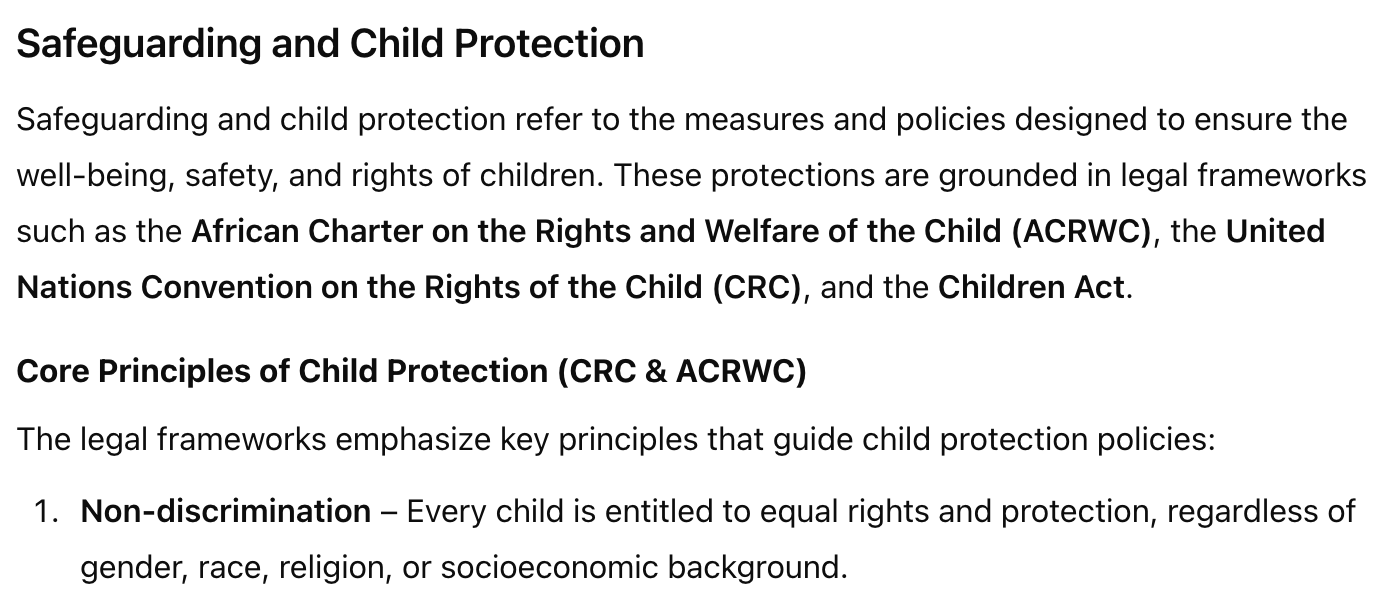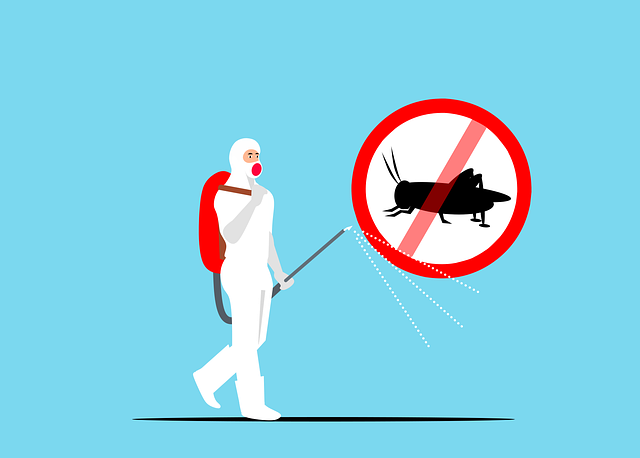Safeguarding and child protection refer to the measures and policies designed to ensure the well-being, safety, and rights of children. These protections are grounded in legal frameworks such as the African Charter on the Rights and Welfare of the Child (ACRWC), the United Nations Convention on the Rights of the Child (CRC), and the Children Act.
Core Principles of Child Protection (CRC & ACRWC)
The legal frameworks emphasize key principles that guide child protection policies:
- Non-discrimination – Every child is entitled to equal rights and protection, regardless of gender, race, religion, or socioeconomic background.
- Best Interests of the Child – All actions concerning a child should prioritize their well-being and development.
- Right to Survival and Development – Children should receive adequate care, health services, and education to support their physical, mental, and emotional growth.
- Right to Participation – Children have the right to express their views on matters affecting them, and their opinions should be considered based on their age and maturity.
Rights of a Child (Children Act)
The Children Act outlines specific rights that must be upheld, including:
- Non-discrimination – Equal rights for all children.
- Best interests of the child – Ensuring every decision benefits the child.
- Right to a Name and Nationality – Every child should be registered at birth and have a legal identity.
- Freedom of Expression – Children can express their views freely.
- Freedom of Thought, Conscience, and Religion – They have the right to choose their beliefs.
- Right to Privacy – Protection from unnecessary public exposure.
- Right to Education – Access to free and compulsory basic education.
- Right to Leisure and Recreation – Play and cultural activities are essential for a child’s development.
- Right to Health and Health Services – Access to proper medical care, including immunization.
- Protection from Child Labor – Children should not be subjected to exploitative labor.
- Protection from Abuse and Neglect – Shielding children from physical, emotional, and psychological harm.
- Protection from Sexual Exploitation – Safeguarding children from sexual abuse and trafficking.
- Protection from Drug Abuse – Preventing exposure to drugs and substance abuse.
- Rights of Children with Disabilities – They should receive dignity, medical care, special education, and training either free or at a reduced cost.
- Administration of Juvenile Justice – Children in conflict with the law should be treated with fairness and dignity.
Duties and Responsibilities of a Child (Section 21, Children Act)
Children are also expected to uphold responsibilities, including:
- Respecting their parents, guardians, and authorities.
- Upholding moral and ethical values in society.
- Participating in their own development and that of their community.
Parental Responsibility (Section 31, Children Act)
Parental responsibility refers to the legal and moral duty of parents to care for and protect their children. It includes:
- Providing Basic Needs – Food, shelter, clean water, clothing, and sanitation.
- Medical Care – Ensuring access to healthcare, including immunizations.
- Education – Supporting a child's right to quality education.
- Moral and Social Guidance – Teaching societal values and general conduct.
- Protection from Harm – Safeguarding the child from neglect, abuse, and discrimination.
- Legal Documentation – Naming the child and ensuring birth registration.
- Guardianship – Appointing a legal guardian in case of the parent's absence.
- Management of Property – Handling the child’s assets in their best interest.
- Migration Decisions – Approving or restricting travel within or outside Kenya.
- Burial Arrangements – Handling burial, cremation, or interment in case of the child's death.
Parental Responsibility Agreement
A Parental Responsibility Agreement is a legal document outlining how parents will share responsibility for raising their child, especially in cases of separation or divorce. It covers:
- Time Allocation – How the child will divide time between parents.
- Visitation Rights – When and how each parent can visit the child.
- Holiday and School Break Schedule – Where the child will stay during breaks.
- Transport and Travel – Guidelines for local and international movement.
- Healthcare Responsibility – Who provides health insurance and medical care.
- Decision-Making Rights – How major decisions regarding the child will be made.
Custody of a Child (Part 10, Children Act)
When determining custody, the court considers:
- The best interests of the child above all else.
- The child’s welfare, safety, and emotional needs.
- The ability of each parent to provide care, stability, and support.
- Any history of abuse, neglect, or violence.
- The child’s own wishes, depending on their age and maturity.
Adoption Process in Kenya
Adoption in Kenya is regulated by law and facilitated through registered adoption agencies. The process involves:
- Selecting an Adoption Agency – Parents must choose a government-licensed agency.
- Submitting an Inquiry – The prospective parents express interest and start the process.
- Screening and Assessment – Background checks and home assessments are conducted.
- Matching Process – The agency finds a suitable child for the adoptive parents.
- Court Approval – A legal process ensures the adoption is in the best interest of the child.
- Post-Adoption Support – Follow-up visits and counseling may be required.
This expanded explanation provides a clearer and more comprehensive understanding of safeguarding and child protection. Let me know if you need further refinement!






